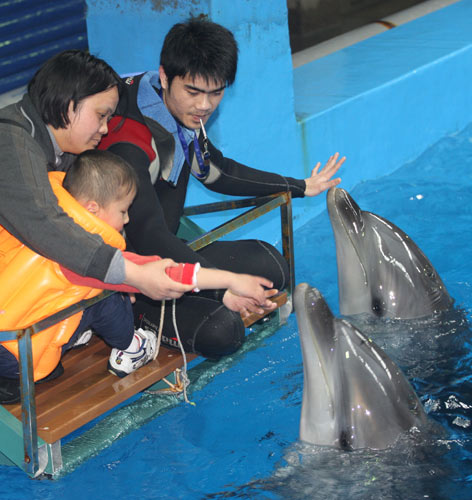Dolphin-assisted therapy helps children with mental disabilities
Updated: 2012-12-16 09:23
By Shi Yingying and Erik Nilsson (China Daily)
|
||||||||
Preliminary tests by the AquaThought Foundation suggest human brainwaves change when they interact with dolphins. One theory says the two species' frequencies sync during interactions.
 |
|
Dolphins help children open up just by simply playing with them. [Photo by Li Bo /For China Daily] |
AquaThought researchers report shifts in neural oscillations among people who interact with the marine mammals. Their studies have measured switches from the beta state of everyday consciousness, to the alpha state that is typical of relaxed closed-eyed wakefulness. Subjects sometimes also slip into the meditative theta state, the results find.
The foundation also measured increased synchronization between the brain's hemispheres, which is linked to enhanced learning and cognizance.
Western therapists have for decades used dolphins to treat children with autism, Down syndrome, cerebral palsy and other neurological disorders.
China has only recently started experimenting with dolphin-swims, among other forms of animal-assisted therapy.
But a lack of scientific affirmation of the treatments' effectiveness isn't the sole source of opposition.
Animal rights advocates oppose the practice.
Marketing director of Shanghai's Changfeng Park Ocean World Xu Jie says the aquarium nixed its dolphin-swim therapy program when British operator Merlin Entertainments invested in the park last year.
"They really value animal rights," Xu says. "They believed it was too much to have the dolphins work as both healers and performers."
That's why Hangzhou Polar Ocean Park has designated two of its 15 dolphins solely for therapy.
"It would be too much for them to both perform and provide therapy," Liu says."The dolphins might feel stress and could even hurt the children."
Each dolphin only sees two or three children a day.
The treatments cost 2,300 yuan ($370) for 15 sessions, given every other day over a month.
Zheng believes it's money well spent.
Whether dolphin-assisted therapy is science or pseudoscience - or something else entirely - the father says his son's progress is the only proof he needs that it works.
Contact the writers at shiyingying@chinadaily.com.cn and erik_nilsson@chinadaily.com.cn.

 Relief reaches isolated village
Relief reaches isolated village
 Rainfall poses new threats to quake-hit region
Rainfall poses new threats to quake-hit region
 Funerals begin for Boston bombing victims
Funerals begin for Boston bombing victims
 Quake takeaway from China's Air Force
Quake takeaway from China's Air Force
 Obama celebrates young inventors at science fair
Obama celebrates young inventors at science fair
 Earth Day marked around the world
Earth Day marked around the world
 Volunteer team helping students find sense of normalcy
Volunteer team helping students find sense of normalcy
 Ethnic groups quick to join rescue efforts
Ethnic groups quick to join rescue efforts
Most Viewed
Editor's Picks

|

|

|

|

|

|
Today's Top News
Health new priority for quake zone
Xi meets US top military officer
Japan's boats driven out of Diaoyu
China mulls online shopping legislation
Bird flu death toll rises to 22
Putin appoints new ambassador to China
Japanese ships blocked from Diaoyu Islands
Inspired by Guan, more Chinese pick up golf
US Weekly

|

|






